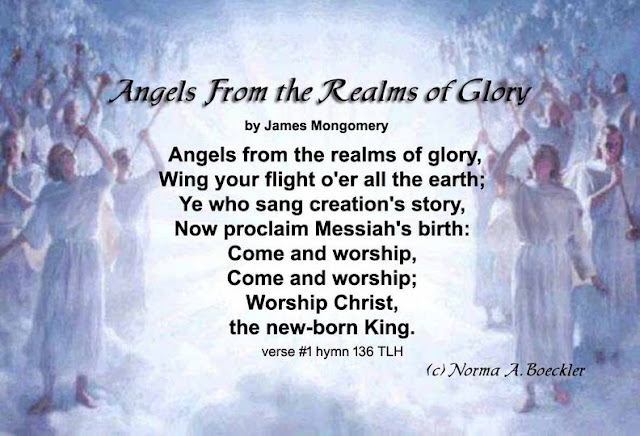Fourth Sunday in Advent, John 1:19-28. The Witness and Confession of John the Baptist; and the Spiritual Meaning of His Witness
John tells them to prepare the way of the Lord. That is to say, they have not the Lord nor his way in them. What have they then? Where the Lord is not, nor his way, there must be man’s own way, the devil, and all that is evil. Judge then, whether those holy wise people are not justly incensed at john, condemn his word, and finally slay both him and his Master! Shall he presume to hand such holy people over to the devil, and denounce all their doings as false, wicked and damnable, claiming that their ways are not the Lord’s ways, that they must first of all prepare the Lord’s ways, and that they have lived all their holy lives in vain?
26. Yet, if he quietly wrote it on a tablet, they might still hear it in patience.
But he gives utterance to it, yea, he cries it aloud, and that not in a corner, but openly under the sky, in the wilderness, before all the world, utterly disgracing before everybody those saints with all their doings and discrediting them with all the people. Thus they lose all honor and profit which their holy life formerly brought them. This certainly such pious men cannot bear, but for God’s and justice’s sake they cannot damn that false doctrine, in order that the poor people may not be mimed and the service of God be not corrupted; aye, finally, they will have to kill John and his Master, to serve and obey God the Father.
27. This, then, is the preparation of Christ’s way and John’s proper office.
He is to humble all the world, and proclaim that they are all sinners — lost, damned, poor, miserable, pitiable people; that there is no life, work, or rank however holy, beautiful and good it may appear, but is damnable unless Christ our God dwell therein, unless he work, walk, live, be and do everything through faith in him; in short, that they all need Christ and should anxiously strive to share his grace.
Behold, where this is practiced, namely, that all man’s work and life is as nothing, there you have the true crying of John in the wilderness and the pure and clear truth of Christianity, as St. Paul shows, Romans 8:23: “All have sinned, and fall short of the glory of God.” This is truly to humiliate man, to cut out and annihilate his presumption. Aye, this is indeed to prepare the way of the Lord, to give room and to make way.
28. Now here are found two kinds of people: some believe the crying of John and confess it to be what he says. These are the people to whom the Lord comes, in them his way is prepared and made even, as St. Peter says in 1 Peter 5:5: “God giveth grace to the humble”; and the Lord himself says in Luke 18:14: “He that humbleth himself shall be exalted.” You must here diligently learn, and understand spiritually what the way of the Lord is, how it is prepared, and what prevents him from finding room in us.
The way of the Lord, as you have heard, is that he does all things within you, so that all our works are not ours but his, which comes by faith.
29. This, however, is not possible if you desire worthily to prepare yourself by praying, fasting, self-mortification, and your own works, as is now generally and foolishly taught during the time of Advent. A spiritual preparation is meant, consisting in a thoroughgoing knowledge and confession of your being unfit, a sinner, poor, damned, and miserable, with all the works you may perform. The more a heart is thus minded, the better it prepares the way of the Lord, although meanwhile possibly drinking fine wines, walking on roses, and not praying a word.
30. The hindrance, however, which obstructs the Lord’s way, is formed not only in the coarse and palpable sin of adultery, wrath, haughtiness, avarice, etc., but rather in spiritual conceit and pharasaical pride, which thinks highly of its own life and good works, feels secure, does not condemn itself, and would remain uncondemned by another.
Such, then, is the other class of men, namely, those that do not believe the crying of John, but call it the devil’s, since it forbids good works and condemns the service of God, as they say. These are the people to whom most of all and most urgently it is said, “Prepare the way of the Lord,” and who least of all accept it.
31. Therefore John speaks to them with cutting words in Luke 3:7-8: “Ye offspring of vipers, who warned you to flee from the wrath to come?
Bring forth therefore fruits worthy of repentance.” But, as said above, the more just people are urged to prepare the Lord’s way, the more they obstruct it and the more unreasonable they become. They will not be told that their doings are not the Lord’s, and finally, to the glory and honor of God, they annihilate the truth and the word of John, himself and his Master to boot.
32. Judge, then, whether it was not a mighty confession on the part of John, when he dared to open his mouth and proclaim that he was not Christ, but a voice to which they did not like to listen, chiding the great teachers and leaders of the people for not doing that which was right and the Lord’s pleasure. And as it went with John, so it still goes, from the beginning of the world unto the end. For such conceited piety will not be told that it must first and foremost prepare the way of the Lord, imagining itself to sit in God’s lap and desiring to be petted and flattered by having long ago finished the way, before God even thought of finding a way for them — those precious saints! The pope and his followers likewise have condemned the crying of John to prepare the Lord’s way. Aye, it is an intolerable crying — except to poor, penitent sinners with aggrieved consciences, for whom it is the best of cordials.
33. But isn’t it a perverse and strange manner of speaking to say, “I am the voice of one crying”? How can a man be a voice? He ought to have said, I am one crying with a voice! — But that it speaking according to the manner of the Scriptures. In Exodus 4:16 God spoke to Moses: “Aaron shall be to thee a mouth.” And in Job 29:15 we read: “I was eyes to the blind, and feet was I to the lame.” Similarly we say of a man that gold is his heart and money his life. So here, “I am the voice of one crying” means: I am one who cries, and have received my name from my office; even as Aaron is called a mouth because of his speaking, I am a voice because of my crying. And that which in Hebrew reads vox clamantis, the voice of one crying, would be translated into Latin: vox clamans, a crying voice. Thus St. Paul in Romans 15:26 says pauperes sanctorum, the poor of the saints, instead of pauperes sancti, the poor saints; and 1 Timothy 3:16: mysterium pietatis (the mystery of godliness) instead of mysterium pium (the godly mystery). Instead of saying: The language of the Germans, I had better say, the German language. Thus “a voice of one crying” means “a crying voice”. In Hebrew there are many similar phrases.
And they had been sent from the Pharisees. And they asked him, and said unto him: Why then baptizest thou if thou be not the Christ, nor Elijah, neither the prophet? John answered them, saying, I baptize with water; in the midst of you standeth one whom ye know not, even he that cometh after me is preferred before me, the latchet of whose shoes I am not worthy to unloose.

























